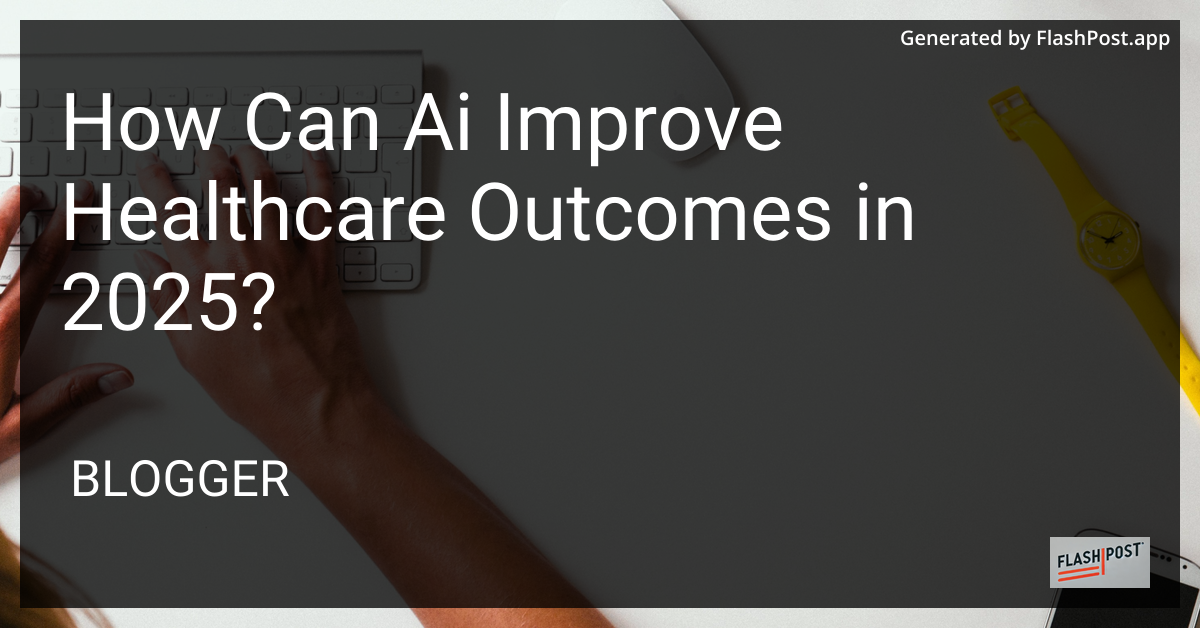How Can Ai Improve Healthcare Outcomes in 2025?

How Can AI Improve Healthcare Outcomes in 2025?
Artificial Intelligence (AI) is revolutionizing numerous industries, and healthcare is no exception. As we project into the future, specifically towards 2025, the integration of AI in healthcare is expected to significantly enhance patient care, streamline operations, and reduce costs. In this article, we explore how AI can improve healthcare outcomes by 2025, providing insight into the transformative potential of this technology.
1. Personalized Medicine
AI has the ability to analyze vast datasets and identify patterns that would be impossible for humans to discern. By 2025, personalized medicine will likely benefit significantly from AI’s ability to tailor treatment plans to individual patients. Genetic information, lifestyle data, and medical history can be processed by AI systems to create customized healthcare strategies, improving artificial intelligence updates on patient outcomes and satisfaction.
2. Early Diagnosis and Predictive Analytics
The capability of AI to predict diseases and detect them at an early stage is a game-changer for healthcare. Algorithms trained on thousands of medical images can identify conditions such as cancer or neurological diseases far earlier than current methods. By 2025, the integration of predictive analytics can lead to earlier interventions, better prognosis, and significantly reduced mortality rates. Healthcare providers can rely on AI tools to ensure precise diagnosis and timely treatment, aligning closely with artificial intelligence advancements.
3. Enhanced Treatment Protocols
With AI’s potential to analyze data from multiple sources like clinical trials and patient records, treatment protocols can become more efficient and effective. By 2025, AI can contribute to developing optimal treatment paths, ensuring that patients receive the best possible care. Moreover, AI-driven research can lead to innovations in drug development and combination therapies, reflecting the forward stride made in trading with artificial intelligence.
4. Operational Efficiency and Cost Reduction
Besides improving clinical outcomes, AI can also optimize hospital operations. AI-powered scheduling, resource allocation, and supply chain management can significantly reduce administrative burdens and costs. By 2025, the healthcare sector can expect streamlined workflows, reduced waiting times, and overall improved patient experiences due to AI-backed operational enhancements.
5. Remote Monitoring and Telehealth
The COVID-19 pandemic accelerated the adoption of telehealth, and AI plays a pivotal role in this transformation. By 2025, AI-driven remote monitoring can enable healthcare providers to track patient health in real-time, leading to timely interventions and reduced hospital readmissions. Such developments ensure that healthcare becomes more accessible, especially in rural and underserved areas.
Conclusion
The integration of AI in healthcare promises a future where medical services are more accurate, efficient, and personalized. By 2025, AI’s influence will extend beyond enhancing individual treatment plans to transforming entire healthcare systems. Staying informed about artificial intelligence updates is crucial for healthcare professionals and patients alike, as these advancements continue to unfold.
Artificial Intelligence, when used ethically and efficiently, holds the promise of a healthier future. As we progress towards 2025, the healthcare industry must embrace AI innovations to unlock unprecedented improvements in patient outcomes and healthcare delivery.
Comments
Post a Comment